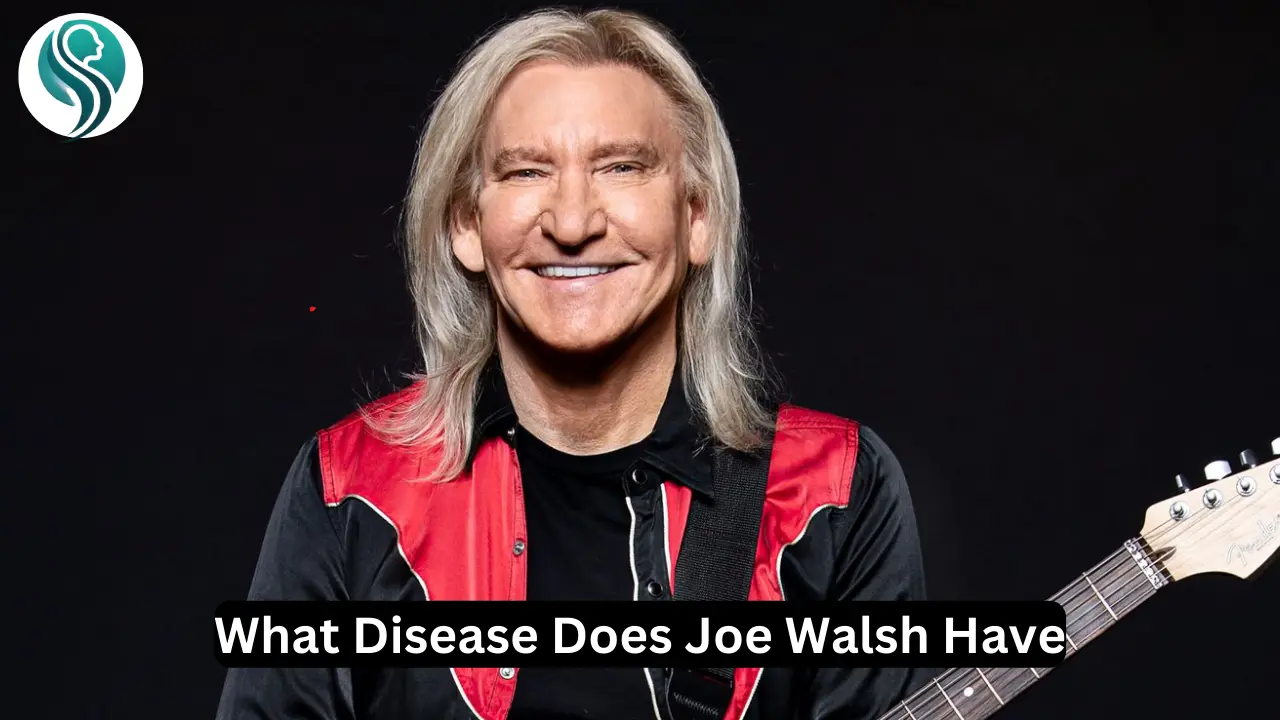Joe Walsh, an iconic American rock guitarist and singer known for his work with the Eagles and as a solo artist, has experienced a series of health struggles throughout his life. While Walsh’s musical talent has captivated millions, his journey has also been shaped by his battles with mental health, addiction, and a condition that many may not be aware of: Attention Deficit Hyperactivity Disorder (ADHD).
In this article, we’ll delve into Joe Walsh’s health challenges, focusing on the primary condition he has been diagnosed with, ADHD. We’ll also discuss how addiction played a role in his life and career, his advocacy work in mental health, and his life after recovery. We’ll also address common questions surrounding his health, age, net worth, and more.
The Struggles Behind the Fame
Joe Walsh’s fame as a musician has been nothing short of legendary. His contribution to rock music as a member of the Eagles and as a solo artist has earned him a place in the Rock and Roll Hall of Fame. However, behind his musical genius lies a battle with mental health and addiction that has significantly impacted his personal and professional life.
While Walsh has faced various challenges, including substance abuse, one condition that profoundly affected his life is ADHD. This condition is often misunderstood, and in Walsh’s case, it impacted his ability to focus, control impulses, and manage his day-to-day responsibilities. Walsh’s story is one of resilience and transformation, as he has worked to overcome his struggles and continues to inspire others facing similar challenges.
Joe Walsh’s ADHD Diagnosis

Joe Walsh was diagnosed with ADHD, a condition characterized by symptoms like difficulty maintaining attention, impulsivity, and hyperactivity. For many individuals, including Walsh, this disorder can make daily life tasks and responsibilities difficult to manage. In Walsh’s case, the high-pressure environment of the music industry exacerbated these challenges.
During interviews, Walsh has discussed how ADHD made it hard for him to stay organized, manage time, and focus on long-term goals. These symptoms, combined with the chaos of touring and recording schedules, made his life feel unmanageable at times. In his early years, there was little understanding of ADHD, and Walsh was not formally diagnosed until later in life, which means he went through much of his early career without proper treatment.
Living with ADHD:
- Struggling with focus: Walsh often found it difficult to concentrate on music or band activities.
- Impulsivity and erratic behavior: His ADHD, combined with substance abuse, sometimes led to unpredictable actions.
- Career impact: ADHD made it hard to follow through on commitments, adding tension within the Eagles and his personal life.
Substance Abuse and Addiction
ADHD wasn’t the only challenge Joe Walsh faced. In the rock-and-roll culture of the 1970s and 80s, substance abuse was rampant, and Walsh fell into the trap of excessive drinking and drug use. His addiction to alcohol and drugs became more pronounced during his time with the Eagles, where the pressures of fame, constant touring, and the lifestyle that came with it fueled his dependency.
By the early 1980s, Walsh’s substance abuse was no longer a hidden problem—it was affecting his health, his relationships, and his career. His addiction caused significant tension among his bandmates, and at one point, it seemed his career was in jeopardy.
The Impact on Walsh’s Speech and Health:
- Fans and bandmates noticed changes in Walsh’s speech. Slurred and incoherent at times, it was often linked to his substance abuse.
- His addiction led to erratic behavior, which strained his relationship with the Eagles, eventually contributing to their split in 1980.
- Substance abuse not only impacted his physical health but also his mental well-being, deepening his battle with ADHD and other mental health issues.
Why Did Joe Walsh Leave the Eagles?
Although Walsh never officially left the Eagles, the band disbanded in 1980, primarily due to internal conflicts and substance abuse problems. The group was facing rising tensions, and Walsh’s battle with addiction was a contributing factor. Fortunately, the Eagles would later reunite, and Walsh’s journey toward recovery played a role in their renewed success.
Joe Walsh’s Road to Recovery

After years of struggling with addiction, Joe Walsh reached a turning point in the early 1990s. Realizing that his life had become unmanageable, he made the courageous decision to seek help. Walsh committed to a life of sobriety, and since then, he has been sober for over three decades.
How Did Joe Walsh Overcome Addiction?
- Rehab and support: Walsh sought treatment through rehabilitation programs and leaned on support groups.
- Commitment to sobriety: Staying sober required dedication, and Walsh has maintained that commitment through lifestyle changes and ongoing support.
- Sharing his story: Walsh has been open about his recovery, using his platform to inspire others to seek help.
With sobriety came a new chapter in Walsh’s life. His health improved, his relationships strengthened, and his career thrived once more. In interviews, he has spoken about how sobriety has given him a second chance and how grateful he is to be alive and well today. His commitment to staying sober remains unwavering, and he continues to be an advocate for addiction recovery.
Managing ADHD and Health in a Rock Star’s Lifestyle
As Joe Walsh reflects on his life and health, he often speaks about the unique challenges of managing ADHD within the unpredictable and high-energy world of rock music. ADHD is a lifelong condition that can affect one’s focus, memory, and organization skills—all of which are crucial for an artist balancing touring schedules, rehearsals, and creative commitments. For Walsh, learning to manage his ADHD without the aid of substances was a vital part of his journey to stability.
In recent years, Walsh has turned to a structured health routine, which includes practices to help him focus and manage ADHD symptoms more effectively. These practices have included regular exercise, a balanced diet, and mindfulness techniques such as meditation, which has been shown to help alleviate some ADHD symptoms. Additionally, Walsh uses therapy and medication under the guidance of mental health professionals to help him navigate the daily impacts of ADHD on his personal and professional life.
Embracing a healthier lifestyle has also improved Walsh’s energy and resilience, making it easier for him to continue performing and touring. The mental clarity that comes with sobriety and routine has allowed him to focus on his music and advocacy work more deeply, helping him stay true to his creative passions while balancing the demands of his health. By sharing his approach to managing ADHD, Walsh continues to inspire others facing similar challenges, showing that with the right support and lifestyle adjustments, it’s possible to thrive even with ADHD.
See Also: What Disease Does Vanna White Have?
Joe Walsh’s Health Today: Life After Recovery
Today, Joe Walsh is a beacon of hope for individuals struggling with addiction. He has embraced his role as a mental health and addiction recovery advocate, sharing his story to inspire others. His battle with ADHD remains, but with sobriety, he has been able to manage it more effectively through medication, therapy, and lifestyle changes.

Joe Walsh’s Advocacy for Mental Health
- Walsh actively supports organizations that promote mental health awareness, such as the National Alliance on Mental Illness (NAMI) and the National Council on Alcoholism and Drug Dependence (NCADD).
- He raises awareness about the importance of mental health treatment and how untreated conditions like ADHD can lead to further problems, such as substance abuse.
By sharing his story, Walsh helps destigmatize both mental health disorders and addiction, encouraging people to seek help. His advocacy work, combined with his personal recovery journey, has inspired many, particularly within the music industry, to address their own mental health and addiction struggles.
Joe Walsh’s Career After Sobriety
Since overcoming his addiction, Joe Walsh’s career has experienced a resurgence. The Eagles’ reunion in 1994 was a turning point, and Walsh’s contributions to the band’s music were once again front and center. The “Hell Freezes Over” tour was a massive success, and Walsh has continued to tour and perform with the Eagles and as a solo artist.
Joe Walsh’s Net Worth Today, Joe Walsh’s net worth is estimated to be around $75 million, a testament to his successful music career, both as a member of the Eagles and as a solo artist. His hit songs, like “Life’s Been Good” and “Rocky Mountain Way,” have remained fan favorites for decades.
Despite the ups and downs of his life, Walsh’s music has continued to thrive. His unique guitar style and powerful voice have earned him a lasting place in the history of rock music.
The Lasting Impact of Joe Walsh’s Journey on the Music Industry
Joe Walsh’s openness about his personal struggles has had a profound impact not only on his fans but also on his peers in the music industry. Walsh has become a strong advocate for sobriety and mental health, encouraging others in a field often dominated by a culture of excess to seek help and live healthier lives. His candid discussions about ADHD, addiction, and recovery have helped destigmatize mental health issues within the music community, sparking conversations that were once taboo.
Walsh’s influence extends beyond his musical talents; he actively supports organizations that help artists navigate the pressures of fame and the toll it can take on mental health. His participation in music industry panels, podcasts, and interviews has highlighted the importance of mental health resources for artists, particularly younger musicians who may feel isolated in their struggles. Walsh’s willingness to share his journey reminds fans and fellow musicians alike that mental health and recovery are integral parts of achieving a fulfilling life, both on and off the stage.
Through his resilience, Walsh has redefined what it means to be a rock star, showing that lasting success comes not only from talent but from the courage to confront personal challenges. His legacy is one of artistic brilliance and human perseverance, proving that healing and growth are possible at any stage of life.
See Also: What Disease Does Dwight Yoakam Have?
FAQs
What disease does Joe Walsh have?
Joe Walsh has been diagnosed with ADHD, which affects his ability to concentrate and manage tasks. In addition, he has battled addiction to alcohol and drugs, but he has been sober for over 30 years.
What happened to Joe Walsh’s speech?
For many years, Joe Walsh’s speech appeared slurred, which was due to a combination of ADHD and substance abuse. Since achieving sobriety, his speech has improved significantly.
Has Joe Walsh passed away?
No, Joe Walsh is alive and continues to perform and advocate for mental health and addiction recovery. Despite rumors about his health, Walsh is active in the music industry and frequently tours with the Eagles.
Why did Joe Walsh leave the Eagles?
Joe Walsh did not officially leave the Eagles. The band disbanded in 1980 due to internal conflicts and substance abuse problems, but they reunited in 1994, and Walsh has been a member ever since.
How did Joe Walsh overcome addiction?
Joe Walsh sought help through rehabilitation and support groups, committing to a life of sobriety. He has maintained his sobriety for over three decades and continues to advocate for addiction recovery.
What is Joe Walsh’s net worth?
Joe Walsh’s net worth is estimated to be around $75 million, thanks to his long and successful career as a musician with the Eagles and as a solo artist.
Conclusion
Joe Walsh’s journey through ADHD, addiction, and recovery is a testament to his resilience and determination. While struggles have marked his life, Walsh’s commitment to overcoming his challenges has made him a symbol of hope for others dealing with mental health and addiction. His music, legacy, and advocacy for mental health continue to inspire fans and individuals worldwide.
In the face of adversity, Walsh has emerged stronger, using his platform to bring awareness to ADHD and addiction recovery. His story is one of triumph over personal demons, reminding us all of the power of perseverance and the importance of seeking help when facing life’s challenges.
Joe Walsh’s health today reflects his progress, both personally and professionally. His legacy as a rock legend is firmly cemented, but his role as an advocate for mental health and sobriety may leave the most lasting impact on future generations.


